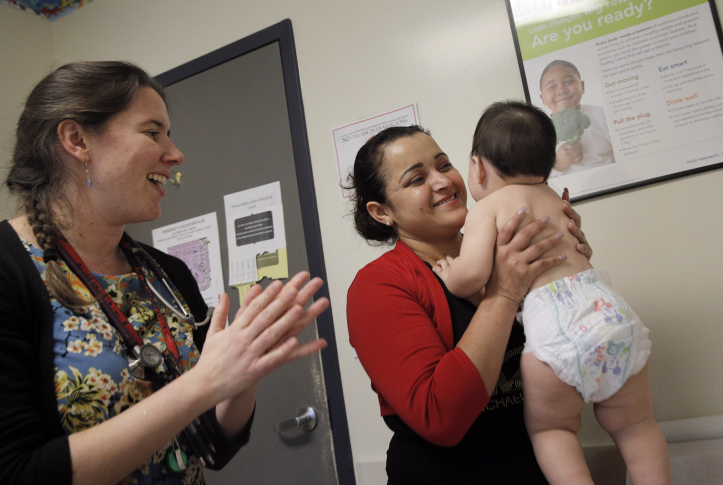Medicaid — the public insurance program for low-income individuals and families — is the nation’s single largest source of health insurance coverage, with almost 90 million beneficiaries. Medicaid spending has increased at an average rate of roughly two and a half times the average growth rate of gross domestic product between 1970 and 2018, making up 17 percent of total health care spending in the United States and nearly 30 percent of state government expenditures. Medicaid policy research often focuses on the program’s ability to provide access to high-quality care, but a primary goal of the program is to protect individuals and families from financial strain.
Medicaid’s Financial Protection
There is a growing body of evidence that Medicaid improves the financial health of its beneficiaries. Medicaid expansion has been shown to increase the number of individuals covered under Medicaid, reduce beneficiaries’ out-of-pocket expenses, and decrease their likelihood of experiencing financial strain (e.g., having debt in collections, declaring bankruptcy, being foreclosed on).
Some studies have evaluated the financial risk protection provided by health insurance by directly examining the economic consequences of adverse health events for people with various types of coverage. For example, a recent study found that hospitalization creates less financial strain for people with Medicaid than for those with private insurance. However, even Medicaid beneficiaries experience some deterioration in financial health despite the lack of substantial cost sharing in Medicaid.
There are important reasons Medicaid provides more financial protection than other types of health insurance. First, Medicaid beneficiaries generally have low or no out-of-pocket costs for health care services. Second, providers cannot balance bill in Medicaid. Balance billing occurs when a provider bills a patient for the difference between the provider’s charge and the amount allowed under the patient’s insurance for a covered service. As a result, hospitalized Medicaid beneficiaries should not be subject to collections debt resulting from health care, except under rare circumstances (e.g., they voluntarily enter into a private pay relationship with a hospital).
However, Medicaid coverage does not always fully protect beneficiaries from financial stress. Findings from the Commonwealth Fund 2023 Health Care Affordability Survey suggest that 21 percent of current Medicaid beneficiaries (compared with 30% of those with employer-based insurance) report having medical or dental debt they are paying off over time. In addition to noncovered services or private services that beneficiaries voluntarily agree to, clerical errors, fraud, or provider uncertainty about an individual’s health insurance may lead to a Medicaid beneficiary being inappropriately billed for a hospitalization or other health care services. Whether such bills are corrected may depend on the extent of community and advocacy resources available.
While most Medicaid beneficiaries are employed, many have precarious employment arrangements with limited paid sick leave benefits, low levels of job security, or hourly wage-based compensation. Being unable to take time off to address illness, losing employment because of a hospitalization, or missing out on needed hourly income can all worsen both physical and financial health in ways that Medicaid coverage cannot protect against. Combined with inequities in the labor market, these effects can perpetuate existing disparities.
Policy Implications
The appropriate policy prescriptions depend crucially on the sources of financial strain. If the issue is inadequate benefits, then several policy measures outlined in the Commonwealth Fund 2023 Health Care Affordability Survey can help, including:
- clarifying rules for noncovered but medically necessary drugs to avoid patients either forgoing treatment or accessing it at a personal expense
- broadening covered services to include dental and vision care
- curtailing the use of waivers that limit retroactive eligibility.
If the issue is financial risk protection because of billing issues (despite existing rules and regulations prohibiting the practice of balance billing in Medicaid), policymakers could consider increased monitoring of providers, surveillance systems that link Medicaid data with credit report data (medical debts over $500 are reported), and stricter penalties for nonadherence. This could also help to identify geographic areas or populations where improper billing is systematically causing financial harm to Medicaid beneficiaries.
Alternatively, if Medicaid beneficiaries are generally protected from high medical costs but their financial health deteriorates after getting sick and missing work, state policymakers may consider developing predictive algorithms that leverage administrative claims data with information about adverse health events. This could flag beneficiaries at risk of wage loss and financial hardship and connect them to additional social services like Social Security Disability Insurance.
One of the most important features of the Medicaid program is the financial risk protection it provides beneficiaries. It is essential to continue to study and monitor the extent of that protection and whether it is being experienced equitably.









